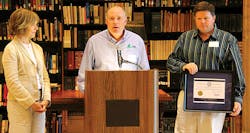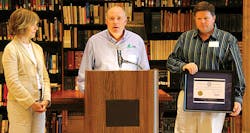Water Briefs
Impacts of hydraulic fracturing on water resources examined in report
The Environmental Protection Agency (EPA) has released a new draft report examining the potential impacts that hydraulic fracturing (fracking) has on drinking water resources across the nation. The purpose of the research is to help clarify the relationship, if any, between these two entities.
Completed at the request of Congress, the assessment shows that while fracking activities in the U.S. are carried out in a way that have not led to widespread, systemic impacts on drinking water resources, there are potential vulnerabilities in the water lifecycle that could impact drinking water.
The study compiles available scientific literature and data to assess how fracking can potentially change the quality or quantity of drinking water resources, as well as identify factors affecting the frequency or severity of these changes.
The EPA-led research efforts involved the analysis of existing data and consisted of a variety of case studies, laboratory studies, scenario evaluations, and toxicological studies. Further, the assessment encompassed water acquisition, chemical mixing, well injection, flowback and produced water, and wastewater treatment and waste disposal.
Hecla Mining Company reaches settlement over CWA violations in Idaho
The Environmental Protection Agency (EPA), U.S. Department of Justice, and Hecla Limited -- owner of the Lucky Friday Mine and Mill (LFMM), a deep underground silver, lead and zinc mine located in the Coeur d'Alene Mining District in northern Idaho -- have reached a settlement concerning water pollution violations near the headwaters of the South Fork Coeur d'Alene River.
Hecla's violations, occurring between 2009 and 2014 at its LFMM, cover both effluent limit violations and unpermitted discharges to the SF Coeur d'Alene River and two of its tributaries. The company's Tailings Pond 3 was found seeping metals-laden water that it discharged into Harris Creek.
During construction of Tailings Pond 4, Hecla failed to install adequate controls to ensure that stormwater runoff was properly managed, and soon turbid runoff destroyed a water intake at a downstream fish hatchery. In all, Agency inspections documented close to 500 combined violations.
The LFMM operations are seen as the highest single contributor of metals to the South Fork above Mullan. Hecla will pay a $600,000 penalty as part of the settlement.
Ambient Water inks multi-million-dollar exclusive licensing agreement
Ambient Water (AWGI), a provider of atmospheric water generation systems, has announced an exclusive licensing agreement with Pacific AirWell Inc. (PA), a California corporation, for sale of its commercial atmospheric water generation technology. The agreement grants PA exclusive rights to use, market and sell AWGI's current and future systems within California, subject to sales and royalty requirements.
Under the agreement, PA will purchase a minimum of $1 million worth of AWGI's technologies for sale within California during the first year. AWGI will receive a 20-percent royalty on all units sold. During the second year, PA will purchase a license from AWGI for $2 million, which will then receive a 25-percent royalty on all units sold. The agreement will continue year-to-year.
AWGI's patented atmospheric water generation technology literally makes water out of thin air, transforming humidity into an abundant source of clean water near the point of use. With multiple systems already commercially available or in development, the company's technology produces clean and fresh water for a host of commercial industries, including oil & gas and agriculture.
European provider to bring water solutions to North American food & beverage industry
Envirogen Technologies Inc., an environmental technology and process solutions provider, has announced that it will begin providing a range of water treatment and management solutions to food and beverage processors in North America.
Currently a European provider of 'end-to-end' water solutions for food and beverage industries, Envirogen will employ a broad-based technology portfolio and operations management expertise to deliver programs for incoming water treatment, process water conditioning, process filtration, water recycle and reuse, and wastewater treatment.
The overall mission of Envirogen is to help North American food and beverage processors prepare water from municipal or impacted groundwater sources, enhance facility throughput, and reduce water footprint at the lowest lifecycle cost.
Solutions include treatment of groundwater and surface water sources via filtration and ion exchange; incoming water treatment solutions via filtration, ion exchange, disinfection, and membrane technologies; process water treatment solutions using membranes, deaeration, disinfection, and sterilization; and wastewater treatment solutions that feature recovery and reuse.
Research finds polluted groundwater could be cleaned with 'breathing' bacteria
According to new research conducted by a team of scientists and collaborators at Rutgers University, a strain of bacteria that "breathes" uranium may hold the key to cleaning up polluted groundwater at sites where uranium ore was processed to make nuclear weapons. The group discovered the bacteria in soil at an old uranium ore mill in the city of Rifle, Colo.
The research is part of a U.S. Department of Energy program to examine if microorganisms can lock up uranium that leached into the soil years ago and now makes well water in the area unsafe to drink. The team's discovery is the first known instance where scientists have found a bacterium from a common class known as betaproteobacteria that breathes uranium.
The Rutgers team was able to isolate the uranium-breathing bacterium in the lab by recognizing that uranium in samples from the Rifle site could be toxic to microorganisms as well as humans. The researchers looked for signs of bacterial activity when they gradually added small amounts of dissolved uranium at the right concentration back to the samples where uranium had become immobilized.
IEC recognized for water equipment exporting
Industrial and Environmental Concepts (IEC), a specialist in the design, fabrication and installation of industrial cover and liner systems, was recently honored as a winner of the Minnesota Governor's International Trade Awards during an award ceremony in the city of St. Paul.
The company was selected for developing and continuing to grow a significant part of its business in foreign markets, as well as developing innovative approaches for competing globally.
Minnesota Lieutenant Governor Tina Smith attended the ceremony and awarded IEC Vice President Mike Morgan and Director of Operations Sean Gallant with the International Trade Award.
"I congratulate these exceptional companies for their successes in international trade," said Governor Mark Dayton.
IEC is a designer, manufacturer and installer of floating covers used in water treatment. The company covers are used worldwide for applications including anaerobic biogas systems, odor control, heat retention, and wastewater treatment for a wide range of municipal and industrial applications. IEC was established in 1993 with headquarters and a fabrication facility located in Lakeville, Minn.
DOE awards EPRI $3M to develop cooling technology for power plants
The U.S. Department of Energy (DOE) has presented a $3-million award to the Electric Power Research Institute (EPRI) in an effort to develop a novel dry-cooling technology for thermoelectric power plants. This endeavor ultimately aims to produce a more cost-effective option for reducing water at these sites.
This new cooling technology has the potential to significantly reduce fan power consumption and steam condensation temperatures compared to current dry-cooling systems. EPRI is teaming with Drexel University, University of Memphis, Evapco, WorleyParsons, Maulbetsch Consulting, and its utility advisors to develop, manufacture and demonstrate a 50-kW indirect technology that would use advanced phase-change materials to improve heat transfer.
DOE's Advanced Research Projects Agency-Energy (ARPA-E) is funding the project under its Advanced Research in Dry cooling program (ARID). The EPRI project is one of 14, totaling $30 million to support development of transformative new power plant cooling technologies that can cost-effectively and efficiently reject waste heat with minimal water evaporation. Teams will work to design kilowatt-scale testing prototypes to help ensure the technologies can be scaled up to megawatt-cooling capacity without significant performance loss.
Interior proposes Stream Protection Rule to safeguard waterways against coal mining
Secretary of the Interior Sally Jewell, Assistant Secretary for Land and Minerals Management Janice Schneider, and Office of Surface Mining Reclamation and Enforcement (OSMRE) Director Joseph Pizarchik have released proposed regulations to prevent or minimize impacts to surface water and groundwater from coal mining. The rule would protect about 6,500 miles of streams nationwide over a period of 20 years, preserving community health and economic opportunities while meeting U.S. energy needs.
The rule would include reasonable and straightforward reforms to revise three-decades-old regulations for coal mining in order to avoid or minimize impacts on surface water and groundwater, fish, wildlife, and other natural resources. The regulation would replace the 1983 regulations and better protect the resources.

